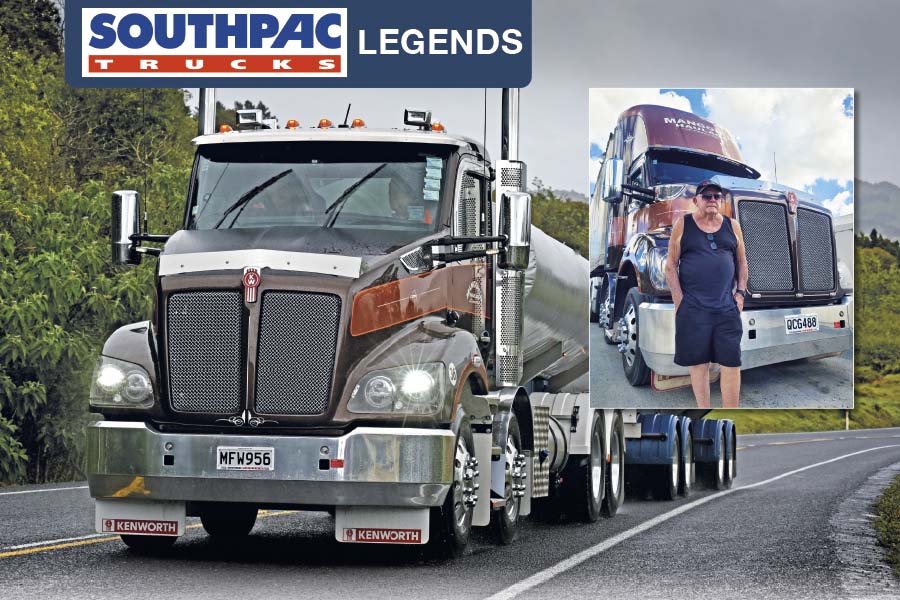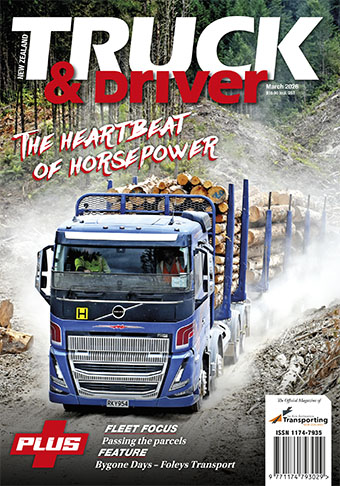Southpac Legends


Bright Spark
Southpac Legends
When it comes to smarts, academia is not always the biggest teller. For example, Dennis ‘Sparky’ Sparksman of Mangonui Haulage couldn’t wait to leave his school in Peria.
However, not only has he been at the forefront of haulage in Northland for over 30 years, but his company is one of the biggest employers in the area too – and for that, he’s a Southpac Legend.
Dennis Sparksman was born in Kaitaia in 1949 and spent his younger and school years in the small town of Peria, just inland from Mangonui. The school part wasn’t his favourite.
“I left school as early as I could,” says Dennis. “I wasn’t a scholar. When I left, I went to Australia for a year and then worked in Auckland for a little while.”
...When it comes to smarts, academia is not always the biggest teller. For example, Dennis ‘Sparky’ Sparksman of Mangonui Haulage couldn’t wait to leave his school in Peria.
However, not only has he been at the forefront of haulage in Northland for over 30 years, but his company is one of the biggest employers in the area too – and for that, he’s a Southpac Legend.
Dennis Sparksman was born in Kaitaia in 1949 and spent his younger and school years in the small town of Peria, just inland from Mangonui. The school part wasn’t his favourite.
“I left school as early as I could,” says Dennis. “I wasn’t a scholar. When I left, I went to Australia for a year and then worked in Auckland for a little while.”
With his travel bug suitably satisfied, Dennis decided to return back home to Northland where he joined an agricultural business his father and uncle had formed, taking his place in the seat of a bulldozer. “I loved the machinery and my heart’s still in driving bulldozers,” says Dennis.
“My parents then moved to Canada and I took over their side of the business, and then my uncle’s side too,” Dennis recalls. “It sounds good, but it was only a couple machines.”
Either way, it was a smart move for the youngster and something he went on to be involved in for around a decade. Unfortunately (or maybe fortunately), when the government removed all the land development subsidies on farming back in the late 70s, Dennis decided it was time to get out of agriculture. So, in 1980 and at the age of 31, Dennis bought a truck and became an owner-driver for Mangonui Haulage.
Mangonui Haulage was already an established business that could trace its roots back to the 1940s as George Small Transport. Small then sold out to John Peat in the mid 1970s and it was bought by Peter and Colin Sole in 1979. The Soles introduced the Mangonui Haulage name and their standout brown and gold livery.
“Peter Sole was a friend of mine and owner of the business – he was very good to me,” says Dennis.
“I started out in a Ford D2418. I was doing livestock and thanks to removable sideboards, I did fertiliser and metal carting too.” Dennis believes that he only had his Ford for a short time before moving to an International T-Line.
Before long, (around ‘82) the Soles decided they wanted out and the business came available. Dennis and three others stepped up to buy it.
“There were three other guys that were involved,” he says. “Two other owner-drivers and one silent partner. The four of us were all equal shareholders but within a couple of years, two of them dropped out and that left Geoff Desmond and myself. Geoff Desmond is quite a familiar name in the transport industry.”
The pair began revolutionising the business, and welcomed technology along the way, claiming: “We were the first business in Mangonui to own a computer – besides the bank.”
“If you don’t embrace technology and take it on board, you get left behind. So, we’ve always had a keen interest in it,” says Dennis.
“We were very much into technology, but it’s left me miles behind now. We were the first ones walking around with a mobile (brick) phone and we had a computer in our office. We were up to speed with everything.”
Geoff pulled out of the business in the early 90s and Dennis bought the remaining shares.
With over three decades with Mangonui Haulage behind him, Dennis has seen and experienced a lot, but it’s clear that the pros far outweigh the cons.
“I think one of our biggest breaks was when we got the contract to cart the logs for Juken Nissho back in 1991. Prior to that, the business was mainly livestock and general cartage.”
Dennis says they were offered a truck by a logging contractor and at around the same time had a meeting with Juken Nissho offering them a contract to cart their wood.
“That led to quite a big expansion. We went from one log truck to 10 in a matter of five years. Which eventually grew to about 35, in the logging area alone. That allowed the business to grow, when you get to 50 trucks that’s a bit of an achievement.”
Dennis says that they also took over Kaitaia Transport’s livestock trucks in the late `80s and went from having two or three trucks to half a dozen.
“Another high point was that we went into Readymix concrete, it was a good move that’s been very good to us and we’re proud of it.”
He says that upgrading the fleet was a good move too.
“When the logging thing started to grow, we purchased a lot of good but second-hand trucks. Then over the last 20 years we’ve worked through that and purchased new trucks – half-a- dozen new every year at one stage. Today the fleet’s average age is 3-4 years. So, we’ve come a long way.”
The fleet itself is fairly varied, but Dennis believes that out of the main truck line up, half would be Paccar products.
“As a mate of mine Warwick Wilshier once said: `they’re [Paccar] a 15 to 20-year truck if you want them to be’. Yes, you’re paying a bit more but you’re paying for the quality and the back up.”
Dennis’s son Sean joined the business in the early 90s, but again not straight from school.
“Dad wouldn’t give me a job driving trucks, so I went and did my time as a mechanic first. That was 1989,” says Sean.
Dennis says that there have been a fair number of low points along the way too though, the latest being how Covid has affected business.
“Covid and the resulting business interruptions, inflation and interest rates going through the roof are challenging, and the roading network up here is terrible,” he says.
Dennis says they have sold the bulk of the logging fleet but still have around 50 trucks, and remain pretty diverse – Readymix, freight, bulk, logging, livestock, rubbish, and containers.
“Diversification is one of our success secrets, you have to be up here, because there’s always one sector of the business that’s not performing for whatever reason. But when they’re all cranking along nicely it makes it worthwhile.
“Staff-wise we’ve got up to 65. We run our own workshop with five mechanics and run an engineering shop as well, so we do a lot of our own repairs. And in the past five years we’ve added a purpose-built workshop in Kaitaia and purchased land in Kerikeri for a Readymix plant.”
In terms of a succession plan, Sean and his brother-in-law Darren now lead the business, with Sean saying that they pretty much look after the day-to-day operations with the support of a good team. They say that Mangonui Haulage is a family owned and run business, even the employees are considered family with the bulk of them being there for 15+ years.
“He also has half-a-dozen grandkids coming through,” says Sean. “At the moment, none are showing the least bit of interest, but things can change over time.”
Dennis is 74 years old, but still makes the short trek from Coopers Beach to the office most days.
“I’ve got to pay my bills,” he jokes. “I just love it. I like the people that are tied up in the industry. I’m semi-retired now so I come into work to drink coffee. If things are going good, I stay and if not, I leave.”
He adds; “From my point of view it’s getting harder and not as much fun as it used to be – but that’s just about getting older too.”
Dennis says that he doesn’t have a lot of hobbies. He has a nice fishing boat but hasn’t been doing much fishing lately.
“My grandsons do all the fishing. They clean the boat, fillet the fish and I just eat the fish.”
He also has a ‘95 Mustang convertible to play around with but says that he’s not that keen on mechanical things. “I’ve spent all my life fixing vehicles so when I have a day off, I don’t want to spend it fixing things.”
Dennis sums up his life in the transport industry by saying: “It’s been a pretty good life mate. Long-standing friendships and relationships with people who are just like ourselves – good, down to earth, genuine people.
“And that tends to be what the industry is full of. It’s the people that keep you in the industry.”



 + EQUIPMENT GUIDE - FREE
+ EQUIPMENT GUIDE - FREE
